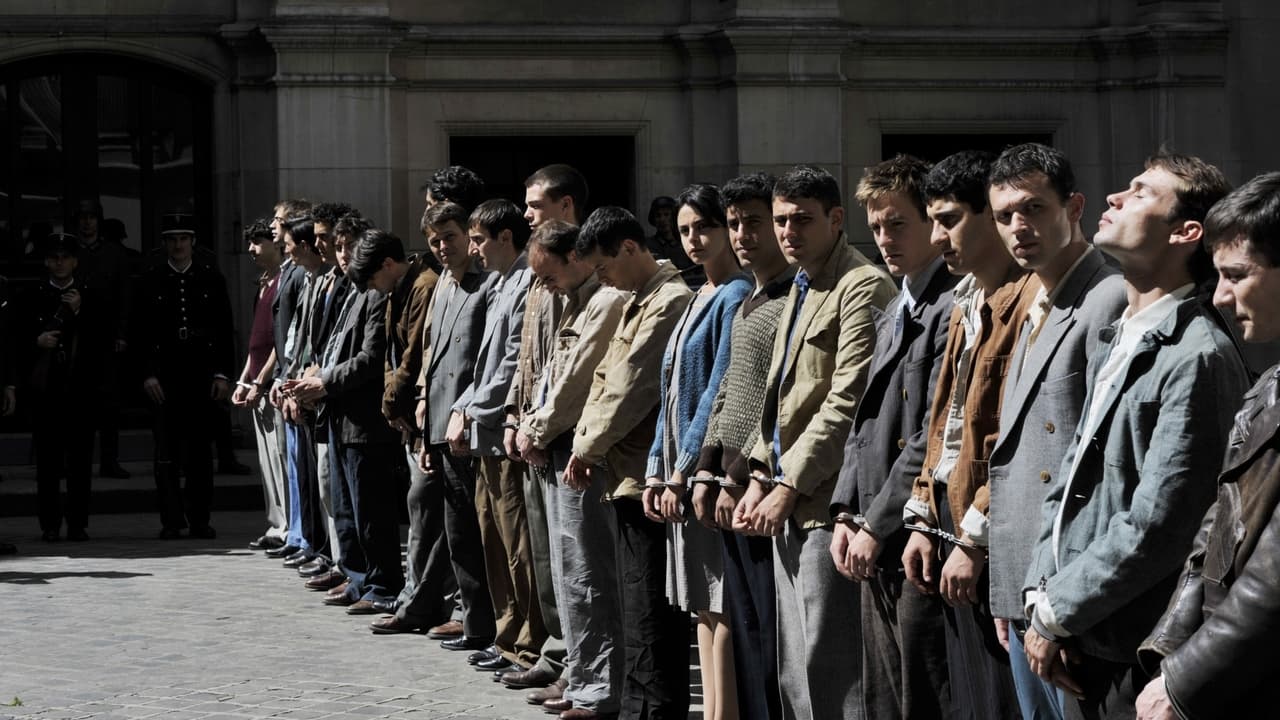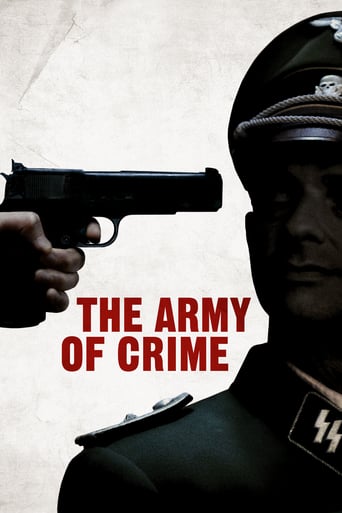



Too many fans seem to be blown away
Instead, you get a movie that's enjoyable enough, but leaves you feeling like it could have been much, much more.
View MoreThe best films of this genre always show a path and provide a takeaway for being a better person.
View MoreOne of the worst ways to make a cult movie is to set out to make a cult movie.
View MoreParis is under German occupation. The Germans invade the Soviet Union and start rounding up communists. Mélinée's husband Missak Manouchian is an Armenian writer who escaped the genocide. Soon, he's picked up the Nazis. She's working with the resistance. He leads them after he's released. Marcel Rayman is a Jew angered by the Nazi propaganda. After his father's arrest, he steals a gun and starts killing German soldiers.This is a traditional movie about the French resistance. Virginie Ledoyen leads a big cast of characters. Fewer lead characters could have intensified each person's story. There are way too many side characters in the group. The movie needs to stay on the Manouchians and Marcel and only them. It's a little stop and go with the flow. It's well filmed but needs a bit more to differentiate from the standard retelling.
View MoreThis film had several good points: It showed the tense but complacent life of Jews in Paris during the occupation. "He'll be eliminated." "You don't know that for sure." It showed the complicity of the French administration doing the Nazi's dirty deeds. But we've seen that before.It gave pause to wonder whether these resistance fighters were actually achieving anything of significance or risking their lives to pop off a few Nazi soldiers for no great tactical advantage.It offered the viewer titillating glimpses of two beautiful actresses, Virginie Ledoyen and Lola Naymark.But on the whole, the movie was dull. The characters were flat. There was little development in the plot: rather, a series of adventures culminating in predictable misadventure. It dragged on from one scene to the next without engaging. Six out of ten.
View MoreHow sad to see Mr Guédiguian pandering to the current craze for movies telling the sorry story of Jews in France under the Nazi occupation. Here Mr Guédiguian, who is an outstanding director having produced wonderful movies, like "Marius and Jeannette", tries to join Jews and partisans, including an iconic Armenian (like himself) character, for whom you cannot help feeling a lot of sympathy. However, there are so many strands in this movie that you never get solidly gripped by one of the many, and the plot disintegrates into a cascade of little streams. Also, the stereotypes of cardboard characters (the Paris ghetto Jewish tailor, the gallant Nazi soldier, the refugee Jewish woman and many others) contribute to make this movie essentially a flesh and blood graphic novel, re-visiting old clichés. There is nothing new here and good actors (like Virginie Ledoyen) do not manage to rescue a completely hopeless script. Not a movie I would recommend.
View MoreA rousing, lengthy and straightforward political thriller about a key aspect of the French resistance during the Second Wold War, Robert Guédiguian's new film focuses on the movement's early stages, when both leaders and foot soldiers made up an organization called the FTP-MOI: Francs-tireurs et partisans – main-d'oeuvre immigrée or Partisans and Irregulars - Immigrant Work Force. it was made up of non-Party member communists or communist sympathizers of foreign, often Jewish, origin -- Spanish, Romanian, Hungarian, Polish, Italian, or, like the director himself, Armenian. Of course resistance tales have been told before, most recently (in a film seen in the US) Danish director Ole Christian Madsen's Flame and Citron, about his country's most famous resistance fighters. Some will point to Jean-Pierre Melville's grim 1969 saga Army of Shadows/L'armé des ombres, which was given its first-ever US release to extravagant praise in 2006. This particular subject was treated in the 1976 French feature L'affiche rouge.Guédiguian's film lacks the noirish flavor of Melville or the Butch Cassidy and Sundance panache of Madsen's film; but it starts well with Grégoire Leprince-Ringuet and Robinson Stévenin as two brave young men who begin acting on their own, and later are recruited to serve a more organized cause. There were always contrasts between young upstarts and disciplined old-timers. Resistance fighters worked outside the law and sub rosa; the "shadow" army was an army of "crime." Though the phrase "Army of Crime" is a Vichy smear issued after the principals of this story were rounded up and eliminated, the resistance life always attracted rebels and outliers.The gentle Armenian poet Missak Manouchian (Simon Abkarian) is the leader. His ballsy girlfriend Mélinée (the lovely Virginie Ledoyen) marries him and becomes a passionate supporter after his release from internment gradually turns him from peaceful propagandist to one capable of throwing a grenade into a German marching squad and taking out a dozen German soldiers (an incident neatly filmed here). He gets to know fiery young Marxist bomb-rigger Thomas Elek (Leprince-Ringuet) and swim-champion-pistol killer Marcel Rayman (Stévenin). Marcel becomes infuriated when his parents are taken away and he learns that he won't ever see them again. He begins asking one German officer after another for a light and then pulling a pistol and killing them. He's good at less close range too and gives Missak a lesson in marksmanship. Thomas blows up a Nazi literary gathering by planting a big copy of Das Kapital with a time bomb inside.Older group leaders periodically chide the younger ones for acting independently and not maintaining cover; but it is one of the older ones who eventually names many members of the group after capture. Various group scenes, including an Armenian musical celebration with Zorba-style performances visited by a group of French cops, show that the authorities are onto the foreign communists and the rashness of one can endanger many.We get a look at French cops called upon by German occupiers to squash the resisters. They enlist a certain Inspector Pujol ( Jean-Pierre Darroussin), who plays a dubious Judas game of informing, rounding up Jews, and gaining rapid promotion by the French Gestapo while simultaneously sympathizing with the partisans, sleeping with a Jewish girl, and doling out favors to her, including gentler treatment for her interned family members. She wants to be a partisan too, but seems destined to go the way of the anonymous protagonist of Max Färberböck's A Woman in Berlin.The FTP-MOI throws out flyers (from above, so they won't be seen) urging the French to sabotage Vichy-run industries. Their other mission is to strike visible blows at the Nazis, assassinating major figures of the Nazis in France like General Julius Ritter.A theme of the film is the complex bonds forged among immigrants and the loyalties among resisters. Missak , whose parents were murdered by Turks, looks upon his Parisian communist friends as his new adopted family. Marcel knows what remains of his family is only his little brother Simon (Léopold Szabatura), and so takes him everywhere; unfortunately that meant that in a raid that targets Marcel, Simon is taken away. An original touch is a homage to the young militant, Henri Krasucki (Adrien Jolivet), who took it upon himself to bring Simon back alive from the concentration camp where they were sent.In The Army of Crime, the mix of nationalities and motivations is continually interesting and harmonizes nicely with the picture of how quite disparate individuals came together Very important also is that toward the end, Guérdiguian films sequences of the mass corralling and deportation of Jewish people by the French out of a stadium, an infamous moment that deserves to be seen as well as read about. The film is less effective in evoking strong emotion, and despite its generally favorable reception in September in France (after a Cannes summer debut), it's been criticized for a lackluster mise-en-scene. Some communist historians in France have insisted that Marcel is over-mythologized; that there was more restraint and coordination and more direct Soviet supervision than is shown. However the film's strengths remain its focus on youth and its strong ethnic and cultural mix.This is involving, fascinating stuff, and as good an evocation of that place and time as I can think of, but it doesn't seem as personal as the other films by Guédiguian that I've seen -- The Town Is Quiet (in US theaters) and Lady Jane (SFIFF). But since he is a communist of working-class origins with an Armenian father, it may be in another sense the most personal thing he has done. Another film of his, the 2006 Armenia/Le voyage en Arménie, is about rediscovering Armenian roots.Shown as part of the Rendez-Vous with French Cinema at Lincoln Center, March 2010.
View More